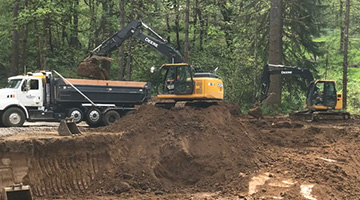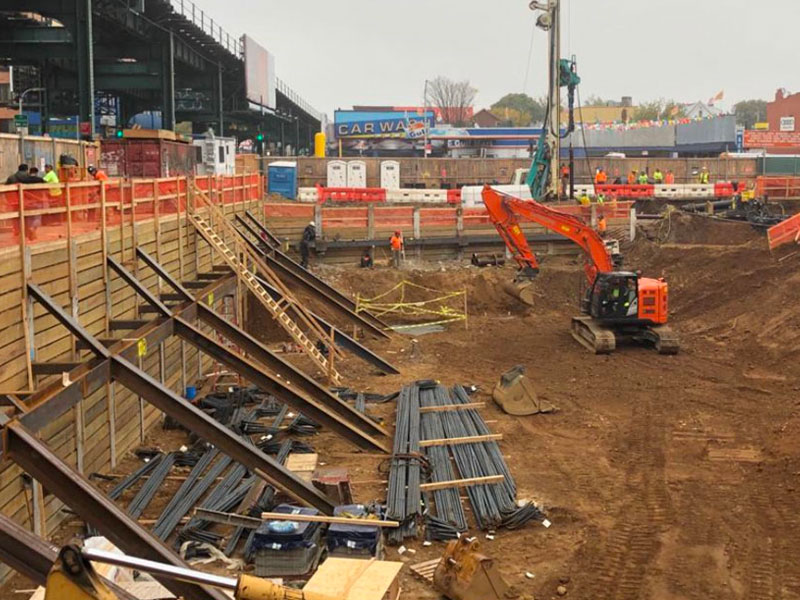Lancaster Trenching - Expert Trenching Solutions in Lancaster, Ohio
Comprehensive Excavation Strategies: Understanding the Basics for Success
In the realm of construction and civil design, the significance of efficient excavation strategies can not be overemphasized. The careful preparation, specific execution, and thorough attention to detail called for in excavation projects demand an extensive strategy that encompasses various basic elements. From first dirt evaluation to the implementation of precaution and regular progress monitoring, grasping these core elements is vital for attaining success in any kind of excavation undertaking. The real mastery lies not simply in comprehending these basics however in perfectly incorporating them to browse the intricacies of excavation jobs with skill.
Recognizing Excavation Task Planning

Effective excavation jobs are developed on the structure of detailed and precise planning. The first phase of any excavation project is the preparation phase, where essential decisions are made that can significantly influence the result of the project. During this stage, it is important to collect all relevant info about the site, consisting of topographical surveys, soil structure, and any possible risks that might exist. Understanding the job budget, timeline, and extent restrictions is crucial for producing a thorough excavation strategy that ensures the job's success.
One trick element of excavation project preparation is the growth of a comprehensive timeline that outlines the series of target dates, activities, and turning points. By meticulously taking into consideration all these aspects throughout the planning phase, excavation tasks can be performed successfully and efficiently, leading to effective end results - lancaster trenching.
Dirt Analysis and Site Analysis
Performing complete dirt analysis and site analysis is a critical action in the preparation stage of any kind of excavation project. Soil evaluation involves establishing the composition, framework, and buildings of the soil at the excavation site. This info is critical for comprehending the dirt's bearing capacity, moisture content, and capacity for erosion, which are crucial factors in determining the excavation techniques and devices needed for the project.
Site examination goes past dirt analysis and includes a wider evaluation of the total website conditions. This evaluation includes identifying any prospective threats, such as below ground energies, ecological concerns, or unstable terrain, that might impact the excavation procedure. By completely assessing the website, project managers can establish effective excavation methods that focus on safety and security, effectiveness, and environmental management.
Using sophisticated technologies like ground-penetrating radar, dirt sampling, and drone surveys can improve the precision and performance of dirt analysis and site evaluation. Spending time and resources in these preliminary actions can eventually save time and prevent costly hold-ups or issues throughout the excavation procedure.
Devices Selection and Usage
Efficient excavation tasks count greatly on calculated devices selection and use to make certain optimal performance and efficiency. Choosing the best tools for the job is crucial in making best use of effectiveness and lessening downtime. Factors such as the this hyperlink sort of soil, deepness of excavation, and job scope play a significant function in determining one of the most ideal devices for the job available.

Along with picking the suitable devices, appropriate utilization is key to project success. Operators has to be educated to deal with the devices safely and efficiently - septic ohio. Routine maintenance checks and timely repair work help avoid failures and ensure constant performance throughout the project
Safety And Security Measures and Laws Compliance
In the world of excavation jobs, prioritizing precaution and compliance with guidelines is extremely important to guaranteeing a safe and legitimately audio operational atmosphere. Precaution encompass a range of practices, including conducting extensive website analyses, implementing appropriate signs and barriers, and providing sufficient safety and security training for all personnel associated with the excavation procedure. Adherence to guidelines, such as OSHA demands in the USA, ensures that the excavation job meets the required standards to safeguard employees, onlookers, and the surrounding atmosphere.

Tracking Progression and Adjusting Strategies
Exactly how can project managers efficiently track the innovation of excavation tasks and adapt their methods accordingly click to read more to optimize outcomes? Monitoring progress this page is vital for making certain that excavation jobs remain on track and satisfy deadlines. Job managers can make use of different devices and strategies to track progress, such as day-to-day report card, routine site inspections, and progressed monitoring innovations like drones and general practitioners tracking systems. By continuously keeping an eye on the project's improvement, managers can identify any kind of potential hold-ups or concerns early on and take aggressive steps to address them.

Final Thought
To conclude, grasping the principles of detailed excavation strategies is necessary for the success of any type of task. By comprehending task preparation, examining dirt and website problems, picking ideal equipment, following security guidelines, and monitoring development, job supervisors can ensure a effective and smooth excavation process. Applying these techniques will result in effective results and lessen prospective risks or problems during the excavation task.
The initial stage of any excavation job is the preparation stage, where vital choices are made that can dramatically affect the outcome of the task. Understanding the job timeline, budget plan, and extent restraints is important for producing a comprehensive excavation strategy that guarantees the project's success.
How can project managers properly track the advancement of excavation projects and adapt their methods as necessary to maximize outcomes? By closely keeping an eye on progression and being willing to adapt techniques, job managers can improve the general success of excavation jobs.
By recognizing project planning, analyzing soil and website problems, selecting suitable equipment, complying with security guidelines, and checking progression, task supervisors can make sure a efficient and smooth excavation procedure.